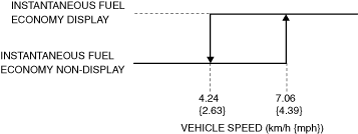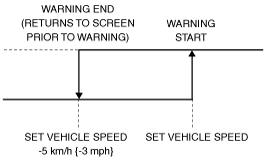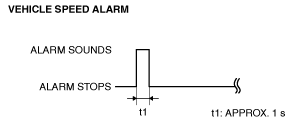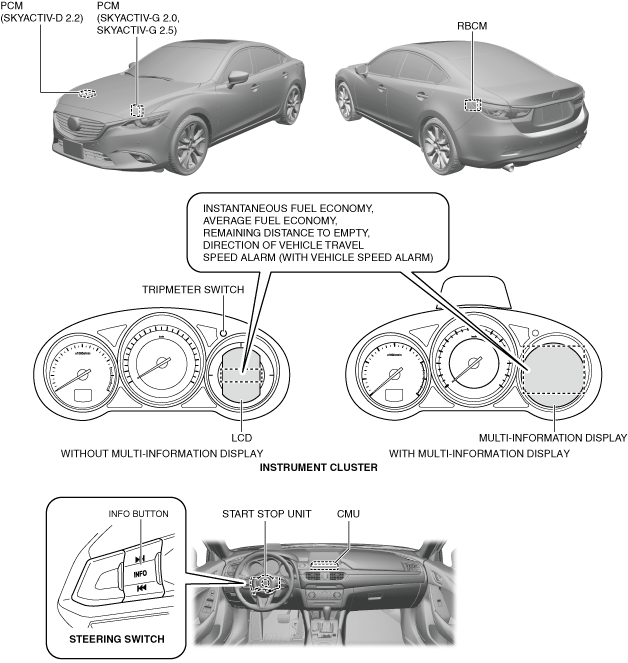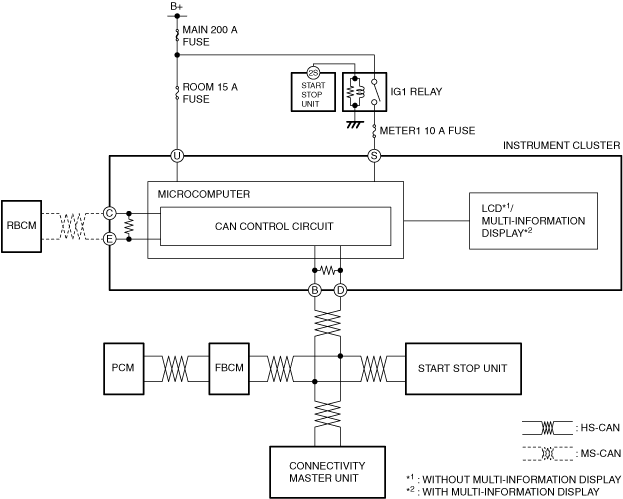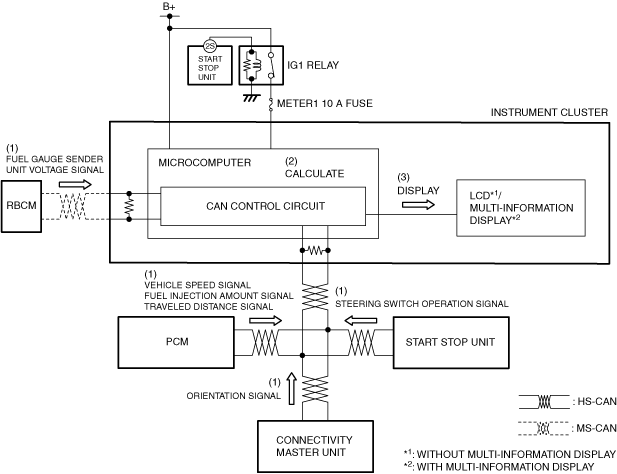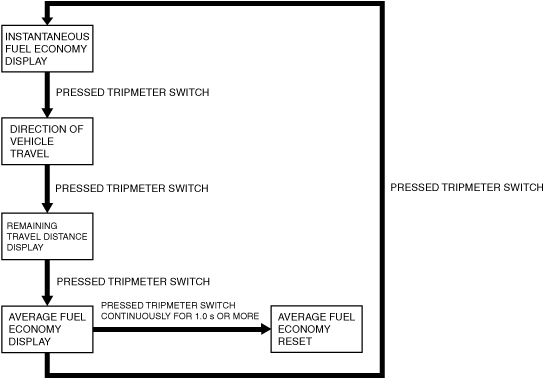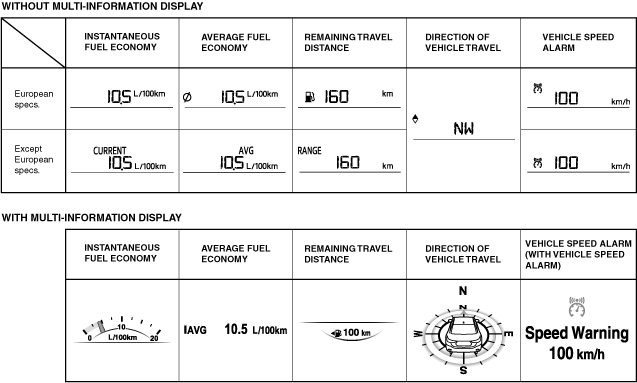TRIP COMPUTER INFORMATION SYSTEM
id092200018000
Outline
• The trip computer is a system which displays the instantaneous fuel economy, average fuel economy, remaining distance to empty, direction of vehicle travel, and the speed alarm (with vehicle speed alarm).
Functions
• The instrument cluster controls the trip computer system based on the following signals.
|
Signal name
|
Sending module/part name
|
Communication method
|
|
Vehicle speed signal
|
PCM
|
HS-CAN
|
|
Fuel injection amount signal
|
|
Traveled distance signal
|
|
Steering switch operation signal
|
Start stop unit
|
|
Orientation signal
|
Connectivity master unit (CMU)
|
|
Fuel gauge sender unit voltage signal
|
Rear body control module (RBCM)
|
MS-CAN
|
Instantaneous fuel economy calculation function
-
• The instrument cluster calculates the instantaneous fuel economy based on the fuel injection amount and traveled distance over the past
2 s when the vehicle speed is at the set value or more. In addition, the calculation results are updated
every 2 s.
Instantaneous fuel economy formula
• When there is no fuel consumption, such as during engine braking, [0.0 L/100 km] or [99.9 mpg] is displayed.
• The instantaneous fuel economy is displayed when the vehicle speed reaches
7.06 km/h {4.39 mph} or more, and [--- L/100 km], [--- L/100 mile], or [--- mpg] is displayed when the vehicle speed decreases to
4.24 km/h {2.63 mph} or less.
Average fuel economy calculation function
-
• The instrument cluster calculates the average fuel economy based on the traveled distance and fuel consumption from connecting the battery or resetting the average fuel economy. In addition, the calculation results are updated
every minute.
Average fuel economy formula
• When the cumulative traveled distance is 0 km {0 mile}, [99.9 L/100 km] or [0.0 mpg] is displayed.
• If the tripmeter switch is pressed for 1.0 s or more while the average fuel economy is displayed, the cumulative fuel economy and cumulative traveled distance data are reset. (without multi-information display)
• If the INFO button is pressed for 1.5 s or more while the average fuel economy is displayed, the cumulative fuel economy and cumulative traveled distance data are reset. (with multi-information display)
• If tripmeter A is reset, the average fuel economy is also reset.
• During the 1 min period after the data has been reset, [--- L/100 km] or [--- mpg] is displayed.
Remaining travel distance calculation function
-
• The instrument cluster calculates the remaining travel distance based on the instantaneous fuel economy at
0.1 km {0.06 mile} prior, cumulative fuel economy, and the fuel tank level. In addition, the calculation results are updated
every 1 s.
Remaining travel distance formula
• The instrument cluster displays [0 km] or [0 miles] when the fuel tank level is 6 L {2 US gal, 1 Imp gal} (without multi-information display)/4 L {1 US gal, 0.9 Imp gal} (with multi-information display).
Travel direction display function
-
• The instrument cluster displays the direction of vehicle travel based on the orientation signal sent via CAN communication from the connectivity master unit (CMU).
Vehicle speed alarm function (with vehicle speed alarm)
-
• The instrument cluster compares the current vehicle speed with the speed set by the user and if the current vehicle speed exceeds the set vehicle speed, the alarm is triggered.
• The set vehicle speed can be set in 10 km/h {10 mph} increments between 30 km/h—250 km/h {20 mph—150 mph}.
• If the vehicle speed alarm is not set, [--- km/h] or [--- mph] is displayed.
• The instrument cluster outputs a warning display and warning sound when the current vehicle speed is the same as the set vehicle speed.
• The instrument cluster switches the warning display back to the screen prior to the warning display when the current vehicle speed is -5 km/h {-3 mph} or less than the set vehicle speed.
• The alarm sound pattern is as shown in the figure.
Structure/Construction
Structural view
System wiring diagram
Operation
1. When the instrument cluster receives (1) a vehicle speed signal, fuel injection amount signal, and traveled distance signal from the PCM, a fuel gauge sender unit voltage signal from the rear body control module (RBCM), an orientation signal from the connectivity master unit (CMU), and a steering switch operation signal from the start stop unit with the ignition switched ON (engine on), it calculates (2) the instantaneous fuel economy, average fuel economy, and remaining travel distance.
2. The instrument cluster displays (3) the calculated result and the direction of travel on the LCD (without multi-information display)/multi-information display (with multi-information display).
Trip computer display switching operation
-
Without multi-information display
-
• The instrument cluster switches the trip computer display content as follows based on the steering switch operation signal from the start stop unit.
-
With multi-information display
-
• For details on the trip computer display switching operation, refer to [MULTI-INFORMATION DISPLAY]. (See
MULTI-INFORMATION DISPLAY.)
Display screen table

